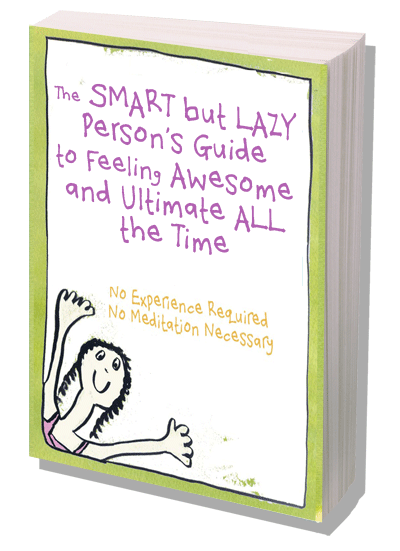When it comes to feelings and what to do with them, there are two schools of thought.
SCHOOL ONE: If you have a feeling that’s bothering you, you should share it.
“Dear Diary, my boyfriend is being an idiot again.”
“Dear Wife, when that man looked at you it hurt my feelings.”
“Dear Therapist, my mother didn’t love me enough, and I always had to make my own school lunch.”
Most therapy is based on the belief that your feelings hold the key to your ‘recovery,’ which is why an average session goes something like this:
Talk, talk, talk, talk talk. Cry. Talk, talk, talk, talk. Analyze, cry, talk talk talk.
And then you do the same thing all over again the following week, for about 5 to 10 years depending on how many feelings you have that you don’t like.
Expressing your feelings, we’re told, is how you develop intimacy with your partner, ‘let go of the past’ and ‘get what you need’. But does it really?
Because guess what: Your feelings aren’t real, they’re not an absolute thing.
Your feelings aren’t absolute, because you can change them in an instant by changing what you’re thinking.
An example of an absolute thing would be: today it’s raining, and when I went outside I got wet.
An example of how you’re feelings are not absolute: Imagine if I told you that your cat had just died – how to do you feel? Sad, devastated or confused since you don’t have a cat? Then what if I said, oh nah, just kidding, your cat’s fine? Now how do you feel? Relieved, annoyed at me for lying to you, pleased this whole unpleasant hypothetical cat incident is over?
Your feelings change depending on what I am saying. No, that’s not right, your feelings are a reflection of what you’re thinking about what I’m saying.
Here’s the other thing about feelings that’s worth considering. Your mood.
Your feelings are a reflection of your thoughts, right?
When you’re in a low mood and feeling negative, sad etc, it’s a temporary thing. Your feelings are nothing more than an indication that you’re caught up in old beliefs or thought patterns tied to the past.
The problem with talking about your feelings when you’re in a ‘low mood,’ is twofold:
- When you feel vulnerable and irritated you don’t think as clearly.
- Your dissatisfied feelings are a reflection of your past and have nothing much to do with what you think you’re annoyed at. Which is why, if you try and deal with them when you’re feeling in a low mood you end up in a round-a-bout conversation. You’re talking about what you think you’re annoyed about – when it’s the iceberg underneath the water causing all the problems for you.
The thoughts you’re having, the same ones you think you need to talk about, are not the same ones you’d be having if you were in better mood.
“Moods are a human condition. You can’t avoid them… Rather than staying stuck in a low mood convinced you’re seeing life realistically, you can learn to question your judgement when you’re in this state. When you’re in a low mood, learn to pass it off as simply that: an unavoidable human condition that will pass with time, if you leave it alone and avoid giving it too much attention.”
Richard Carlson author of
“You Can Be Happy No Matter What”
This is why when you’re depressed, the best way to deal with all those negative thoughts running through your head is to ignore them. Wait until your low mood has passed, then bring it up.
When you’re in a low mood, it will seem imperative that you sort things out, that you solve the ‘problem’ but it’s not, This is just a trick your mind is playing on you.
Which brings me to …
SCHOOL TWO: If you have a feeling and it’s bothering you – wait until you don’t feel bothered before sharing it.
Waiting until you’re in a high mood, as compared to a low mood, gives you the best opportunity to find a solution. You’re not beset by negative thinking caused by old memories so you can deal with the issue as it is today in its clearest form.
(Although, more often than not, there isn’t actually an ‘issue’ that needs discussing – it was all made up because of your temporary wonky thinking.)
Happy days!
PS: This is a whole different way see yourself, your feelings and problem solving, than we’re brought up to do. But it works. And it makes sense. To find out more you can do what I did and spend a year being silent – nothing like spending a year being silent to understand the true nature of your mind – or you can read more about it in Richard Carlson’s book, You Can Be Happy No Matter What: Five Principles for Keeping Life in Perspective which I discovered for the first time last week. In my opinion one of the best self help books on the market. (Don’t be put off by the title. Richard Carlson is also the author of the mega popular ‘Don’t Sweat the Small Stuff.’)



1disagree